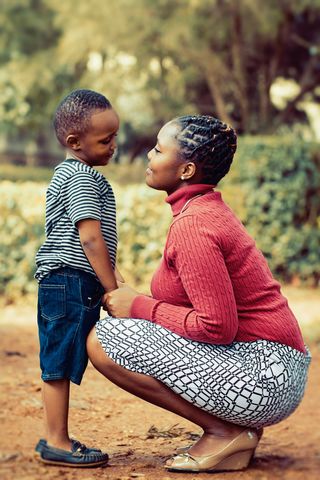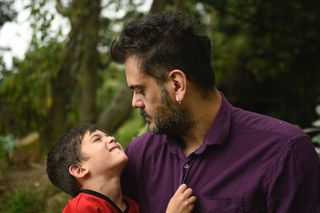Divorce
How You Can Shape Your Children’s Story of Your Divorce
The story they will tell has a powerful impact on their future quality of life.
Posted January 7, 2020
Does life shape stories or do stories shape life? The short answer is: both.
We all look for meaning in our experiences and form narratives about our histories. This evolutionary adaptation has helped us survive over the millennia. As stories are passed from one generation to the next, they have a powerful influence over how we see the world. Is the world a safe place, or does danger lurk around every corner? Are people trustworthy or must we always carry suspicions of people’s motives?
Sometimes stories are rigid and unchangeable, and other narratives shift as the storyteller tells the story. Psychotherapy often helps clients deconstruct the story that keeps them stuck, opening space for new interpretations or forgotten details.

The story you tell yourself about your life and your history, begins in childhood. And parents have the biggest influence on their children’s stories. My husband, who has six siblings, says that when he and his siblings talk about their childhoods, one would think they were raised in seven different families. What factors shape our stories and how does our story influence our lives? The stories that are formed in childhood affect our future well-being, our satisfaction in life, our success in school, career, and relationships, our mental health, and world view.
Inevitably, kids tell themselves and others a story of their parents’ divorce. Younger children may have the story that they caused the divorce, older kids may develop a blaming story toward one parent, or a story that a parent is vulnerable and needs rescuing. So, it is important to understand how you can help shape the stories your kids will tell of the divorce when they are grown. Obviously, there are limits to what you can control, so knowing your contribution gives you some control you wouldn’t have otherwise.
These are three factors that shape a child’s story:
- What you tell the child about the divorce and the other parent. Children believe what you tell them!
- How your children interpret what they see with their keen skills of observation. Kids don’t miss a thing!
- The external circumstances and losses that underlie their experience of the divorce: witnessing or experiencing abuse or neglect, a parent moving away or having an affair, parents are emotionally unavailable due to mental illness, addiction or repeated litigation.
Other factors certainly affect kids’ interpretation of their experiences. These have been well-researched and include developmental age, attachment styles, and temperament. In this article, I am focusing on those factors over which parents have some control.
What you tell your children has a powerful influence on their divorce stories.
I know that all parents love their children and want the best for them. Parents do not intentionally hurt their kids or want them to be damaged by divorce. But I have noticed that during a divorce, parents often are in denial about how much their children are suffering.
I worked with a young teenage girl whose parents were the middle of a difficult divorce. Mom told her daughter that she wasn’t safe with her dad, that her dad was a “womanizer” and had “abandoned” the family. The client began to refuse to see her father during his custodial time and developed a serious eating disorder for which she was hospitalized several times. Ultimately, this 12-year-old girl went to court and told the judge that if he forced her to see her father, she would starve herself to death. Ten years later she reconnected with her father and rejected mom’s stories about him. Then she rejected her mother and cut off all contact with her.
I have seen parents tell their children that the other parent is a “narcissist” or a “borderline.” Some parents have told their children that the other parent is an addict, or doesn’t care about or love them, or that the other parent is simply a “bad parent.” Another story that I have often heard is “We can’t have Christmas this year (or vacation, or birthday) because your mom (or your dad) took all our money.”
Some parents tell the kids these things intentionally because they think the kids need to know “the truth” or “who mom really is.” They tell me, “I won’t lie to my kids.”
These messages go deep into the children’s psyche. They internalize them as absolute truths. The ramifications are many: children may lose a connection with a beloved parent or may distrust or hate that parent. They then go on to develop stories, such as “Men are not to be trusted,” or “I am not good enough (because mom abandoned us).”
You can control what you tell your child about the divorce or about the other parent. This calls for self-awareness and self-control.
How your children interpret what they see and hear

I hear from divorcing parents all the time, “My kids are fine,” or “They don’t understand what’s going on,” or “My kids are resilient.” I believe that because many of these parents are in the middle of their own emotional rollercoaster, they are in denial about how their kids are doing. And many kids appear to be coping on the outside, when in fact they are metabolizing the turmoil whirling around them. This is how the story of their parents’ divorce begins.
Most parents tell me that they do their best to protect their children from the conflict between the parents. They are careful to not argue at the front door when the kids are dropped off or picked up. They walk out of the room when a telephone conversation with the ex becomes heated. When their kids are around, they try to mask their words when talking on the phone about the ex to someone else.
One mom refers to “D-A-D” when talking to friends about what a bad parent he is. She complains that the children come home tired or dirty, or have not eaten well, or didn't do their homework. She says these things while her kids play nearby, and she believes that they are not listening or paying attention. She is wrong. These kids pick it up even when you believe you are sheltering them. And as they unconsciously make sense of it, they internalize a belief that is not healthy for them. The story or belief might be something like “Mom hates my dad,” or “Dad doesn’t take care of me.”
All parents are sincere in their desire to protect their kids. However, your kids are keen observers. They can tell when there is tension between their parents, when you are angry or stressed, or when you are silent and shut down. They see it in your face and your body language. They feel it when you hug them.
You can usually control what your child sees, although you probably can’t control how they interpret what they see without talking about it. If you are aware that your child has observed or heard something upsetting, try to talk about it. Prioritize your child's need to love both parents, without being in a loyalty bind.
The external circumstances and losses
Kids experience the divorce directly: witnessing or experiencing abuse or neglect, a parent moves away, or has an affair, parents are emotionally unavailable due to mental illness or repeated litigation. Kids’ contact with each parent is severely cut back with shared custody, and this is a huge loss for them. They go from seeing their parents daily to seeing one parent at a time, and perhaps only 50% or less of the days. Some kids are subjected to lengthy custody evaluations or are brought to court to testify against a parent.

One father told me he moved 2500 miles away so that he and his ex would stop fighting. He was sick of going back to court, so he moved and withheld the child support to punish his ex. (He didn’t think about how this would impact the kids.) A mother told me that she would not allow her ex into the house to pick up the kids unless he agreed to her demands in court.
These kids were cut off from one of their parents, experiencing a deep loss with no way to understand it. Their parents did their best but didn’t understand that the explanation they gave only increased the damage they were causing.
In families where there has been abuse, violence, or addiction, safety for the children is the obvious priority. However, I have seen many cases of an angry or vengeful parent developing a misrepresentation or even a fabricated story that alienates the children against their other parent. While these parents don’t intend to hurt their kids, their lack of self-awareness leads them to behave in damaging ways.
While you cannot always control external circumstances, you can usually help your children make sense of them in ways that contribute to their developing a healthier story that builds their resilience.
One day, maybe years from now, your adult children will be talking about their parents’ divorce with their friends over dinner or drinks. What is the story you would like your child to tell? With an awareness of how these factors contribute to the development of their story, you can begin to help your child develop a story of resilience.
© Ann Buscho, Ph.D. 2019




